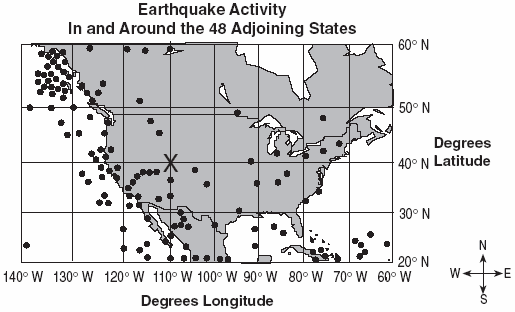
|
SuperTeacherTools |
|

|

|
Scoring is built in for each team.
You can also choose to use a timer below.
|
Prefer the old Flash template? Switch now: Science PSSA 2 Jeopardy Review Flash Version Science PSSA 2 |
|
The drawing below shows the original size and shape of a rock sample before it is thrown into a rapidly moving stream.
Which drawing best shows the actual size and shape the rock will have after being carried several hundred miles downstream and deposited?

Base your answers to the following questions on the cross section below and on your knowledge of science. The cross section shows the heat flow and movement of some material within Earth, causing sections of Earth’s crust (plates) to move.
How does the temperature of Earth’s crust compare to the temperature of Earth’s interior? [1]

Four identical sand castles are shown below. Which sand castle will most likely be eroded fastest by the wind?

Oceans, glaciers, lakes, and rivers are part of Earth’s
(1) atmosphere
(2) hemisphere
(3) hydrosphere
(4) lithosphere

Which factor contributes to global warming?
(1) increased use of solar-powered cars
(2) increased burning of fossil fuels
(3) better long-term weather forecasts
(4) changing distance between Earth and the Sun


____________________________________________________________________________
____________________________________________________________________________

The diagram below uses letters A, B, C, and D to represent processes occurring in a water cycle.
Identify the process that is occurring at each letter in the diagram. Select the process from the list below. [2]

Base your answers to the following questions on the partial map of the State of Wyoming below. The locations of Casper and Rawlins, Wyoming, are shown.

__________________________________________________________________________

Which group of organisms is missing from this food web?
(1) carnivores
(2) herbivores
(3) omnivores
(4) decomposers

The diagram below shows a food web.
Which three organisms in the food web are competing for the same food resource?
(1) carrot, rabbit, and fox
(2) grain, bird, and owl
(3) fox, owl, and rabbit
(4) bird, mouse, and grasshopper

Which process gives rise to a variety of traits within a species?
(1) sexual reproduction
(2) dynamic equilibrium
(3) cellular respiration
(4) internal regulation

Base your answers to the following questions on the diagram below and on your knowledge of science. The diagram shows two students readu to dive into a pool.
Explain why student B has more potential energy than student A. [1]
_________________________________________________________________

The diagram below shows two different-colored moths resting on a tree trunk.
How does this difference in pattern and color affect the moths' ability to survive in the environment? [1]
_________________________________________________________________
_________________________________________________________________
_________________________________________________________________

Base your answers to the following questions on the table below, which compares human populations and carbon dioxide (CO2) levels in the atmosphere over time.
Human Population and Carbon Dioxide Levels
|
Year |
Human |
Carbon Dioxide (CO2) |
|
1960 |
2.50 |
317 |
|
1970 |
2.75 |
325 |
|
1980 |
3.00 |
337 |
|
1990 |
5.00 |
342 |

A student is given a mixture of salt, sand, and iron filings. Explain two laboratory methods that the student could use to physically separate some of these substances. [2]

Which substance provides humans with their main source of energy?
(1) food
(2) carbon dioxide
(3) water
(4) chlorophyll

Base your answers to the following questions on the diagrams below and your knowledge of science. The diagrams show liquid water changing to water vapor in four different situations.
Which observation would be evidence that the water is undergoing a phase change?
(1) Waves form on the top of the pond.
(2) Water soaks into the wet sand.
(3) The water splashes out of the swimming pool.
(4) The water level in the glass of water decreases.

Base your answers to the following questions on the information and diagram below.
A student was given samples of four different liquids, A, B, C, and D. The student poured equal amounts of two different liquid samples into several test tubes. The results are shown in test tubes 1, 2, 3, and 4.
What physical property of the liquids causes them to separate into different layers when poured into the test tubes? [1]
_________________________________________________________________

1. The Rock Cycle
3. Smooth and smaller
12 hours
Earth's inside is much hotter than the surface.
3. The fastest wind speed and nothing to block the wind.
Four identical sand castles are shown below. Which sand castle will most likely be eroded fastest by the wind?
3.) hydrosphere
2.) increased burning of fossil fuels.
Two tectonic plates meet at the west coast.
More volcanoes.
A. Evaporation
B. Condensation
C. Precipitation
D. Runoff
Earth's rotating and the sun rises in the east.
3 organisms eat mice
4. decomposers
1. Community
4. bird, mouse and grasshopper
1.) Sexual reproduction
Freezing
Student B is higher than student A.
Allows the dark organism to be more fit or better able to survive in this environment.
3. The human population increased and the CO2 levels increased.
You could filter the mixture, use a magnet, or use evaporation.
1.) Food- it provides calories
4. Water level decreases
Base your answers to the following questions on the diagrams below and your knowledge of science. The diagrams show liquid water changing to water vapor in four different situations.
Density
1. Solid particles are close together
Which graph best represents the relative distance between the particles of most substances in their solid, liquid, and gas states?
2. Convection Currents
How is heat energy transferred within the liquid water in the pond?
(1) compound formation
(2) convection currents
(3) chemical reactions
(4) nuclear reactions





